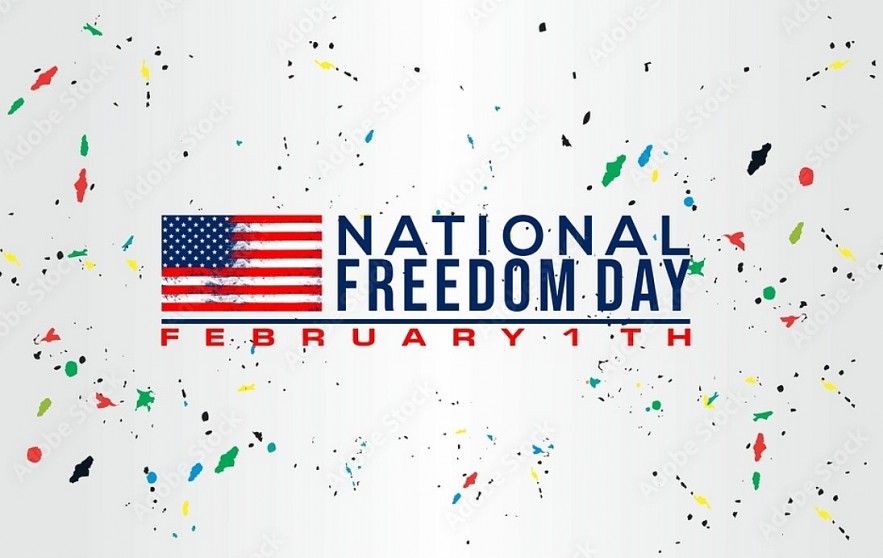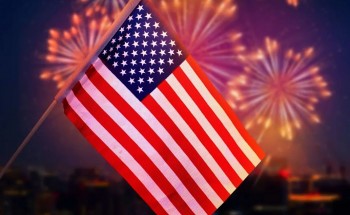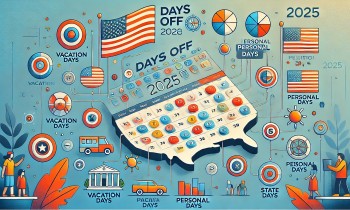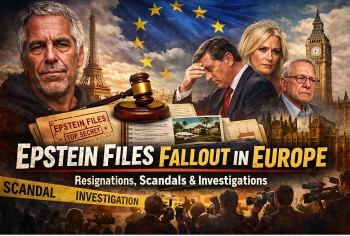What is National Freedom Day: Date, History, Significance, and Celebration
 U.K. Calendar in February 2025: List of Bank Holidays, Special Days, and International Events U.K. Calendar in February 2025: List of Bank Holidays, Special Days, and International Events |
 Canada Calendar in February 2025: List of Public Holidays, Special Days, and International Events Canada Calendar in February 2025: List of Public Holidays, Special Days, and International Events |
What is National Freedom Day?
National Freedom Day honors the emancipation from slavery and is always celebrated on February 1st. It also acknowledges that America is a representation of freedom. The day commemorates Abraham Lincoln's signing of a joint House and Senate resolution that became the 13th Amendment to the Constitution of the United States. On February 1, 1865, President Lincoln signed the Amendment that made slavery illegal. However, the states did not ratify it until December 18, 1865.
 |
| National Freedom Day |
When is National Freedom Day?
National Freedom Day, observed annually on February 1, commemorates the signing of the 13th Amendment to the U.S. Constitution by President Abraham Lincoln in 1865. This pivotal amendment abolished slavery in the United States, marking a significant milestone in the nation's journey toward justice and equality.
The History of National Freedom Day
The 13th Amendment and Its Importance
The 13th Amendment, signed on February 1, 1865, and ratified on December 6, 1865, formally abolished slavery and involuntary servitude in the United States, except as punishment for a crime. This groundbreaking legislation ended centuries of legalized slavery, fundamentally reshaping the nation's legal and moral framework.
While the signing of the 13th Amendment was a monumental achievement, it was only the beginning of the struggle for equality. The amendment provided a legal foundation for the civil rights movement and remains a cornerstone of America’s commitment to liberty and justice.
The Origins of National Freedom Day
National Freedom Day was the brainchild of Richard R. Wright Sr., a former slave who became a prominent educator, activist, and community leader. Wright believed that February 1, the day President Lincoln signed the 13th Amendment, should be a national day of celebration to honor freedom and promote unity among all Americans.
Wright’s vision became reality when President Harry S. Truman signed a proclamation in 1948, officially designating February 1 as National Freedom Day. While it is not a federal public holiday, it is recognized across the country as a day to reflect on the importance of freedom and equality.
Why National Freedom Day Matters
National Freedom Day is a powerful reminder of the ongoing pursuit of justice and equality in the United States. It serves several critical purposes:
- Commemorating the Abolition of Slavery: The day honors the historical significance of the 13th Amendment and the countless individuals who fought for freedom.
- Promoting Education: By highlighting the history and impact of slavery, National Freedom Day encourages Americans to learn from the past to build a better future.
- Celebrating Progress: The day recognizes the progress made toward racial equality while acknowledging the challenges that remain.
- Inspiring Unity: National Freedom Day emphasizes the shared values of liberty and justice, bringing together people of all backgrounds to celebrate freedom.
How National Freedom Day is Observed
National Freedom Day is marked by a variety of events and activities that emphasize education, reflection, and community engagement.
1. Wreath-Laying Ceremonies
One of the most significant traditions is the wreath-laying ceremony at the Liberty Bell in Philadelphia, Pennsylvania. The Liberty Bell, a symbol of American independence and freedom, serves as a poignant backdrop for this solemn tribute to the 13th Amendment and those who fought to end slavery.
2. Educational Activities
Schools, libraries, and cultural institutions across the country organize events to educate the public about the history of slavery and the significance of the 13th Amendment. These activities often include:
- Lectures and panel discussions featuring historians, scholars, and civil rights leaders.
- Documentary screenings that explore the abolition of slavery and its legacy.
- Interactive workshops for students, focusing on themes of freedom, equality, and human rights.
3. Community Events
Local communities come together to celebrate National Freedom Day through parades, public gatherings, and storytelling sessions. These events often include:
- Readings of historical documents, such as the Emancipation Proclamation and the 13th Amendment.
- Musical performances, featuring spirituals and songs that reflect the struggle for freedom.
- Art exhibitions, showcasing works inspired by the themes of liberty and justice.
4. Reflection and Personal Observances
Many individuals observe National Freedom Day by taking time to reflect on the sacrifices made to secure freedom and the ongoing fight for equality. Activities might include visiting historical landmarks, reading about the history of slavery, or discussing the significance of the day with family and friends.
National Freedom Day Across the United States
While National Freedom Day is recognized nationwide, certain cities and states hold particularly notable celebrations:
- Philadelphia, Pennsylvania: As the site of the Liberty Bell, Philadelphia plays a central role in National Freedom Day observances. The city hosts ceremonies, educational events, and community gatherings to honor the occasion.
- Washington, D.C.: Events at landmarks such as the Lincoln Memorial and the National Museum of African American History and Culture provide opportunities for reflection and education.
- Southern States: In states where the legacy of slavery is deeply felt, churches and community organizations often host events that blend remembrance with hope for the future.
Lessons from National Freedom Day
National Freedom Day is not only a day of commemoration but also an opportunity to draw important lessons for the present and future.
-
The Importance of Freedom
The 13th Amendment reminds us of the value of freedom and the sacrifices required to secure it. National Freedom Day encourages Americans to cherish their liberties and work to protect them for all.
-
The Power of Education
Understanding the history of slavery and its abolition is essential for fostering empathy and promoting social justice. National Freedom Day provides a platform for learning and dialogue.
-
The Need for Unity
National Freedom Day emphasizes the importance of unity in overcoming injustice and building a more equitable society.
Conclusion
National Freedom Day, observed on Saturday, February 1, 2025, is a poignant reminder of the nation’s commitment to liberty and justice. By commemorating the signing of the 13th Amendment, the day honors the triumph over slavery and the ongoing struggle for equality.
Through wreath-laying ceremonies, educational initiatives, and community celebrations, National Freedom Day provides an opportunity for Americans to reflect on their shared history, celebrate progress, and reaffirm their commitment to the ideals of freedom and justice for all.
As the United States continues to grapple with issues of inequality and discrimination, National Freedom Day serves as both a reminder of how far the nation has come and a call to action to continue the work of building a fair and inclusive society.
Frequently Asked Questions (FAQs)
1. What is National Freedom Day?
National Freedom Day, observed on February 1, commemorates the signing of the 13th Amendment, which abolished slavery in the United States.
2. Who established National Freedom Day?
National Freedom Day was proposed by Richard R. Wright Sr., a former slave and activist, and was officially recognized by President Harry S. Truman in 1948.
3. How is National Freedom Day observed?
Observances include wreath-laying ceremonies, educational events, community gatherings, and personal reflections on the importance of freedom and equality.
4. Where are the main celebrations held?
Significant celebrations take place in Philadelphia, Pennsylvania, at the Liberty Bell, as well as in other cities with historical ties to the abolition movement.
5. Why is National Freedom Day important?
The day honors the abolition of slavery, celebrates progress toward equality, and reminds Americans of the ongoing need to fight for civil rights and social justice.
National Freedom Day is a powerful celebration of liberty and an enduring symbol of hope for a better, more just future.
 US Calendar 2025 - Full List of Public Holidays And Observances: Dates and Celebrations US Calendar 2025 - Full List of Public Holidays And Observances: Dates and Celebrations Check out USA Calendar in 2025 for a complete list of public holidays, federal holidays, state holidays and observances. KnowInsiders also keeps you up to ... |
 2025 US Calendar with Holidays for Nonprofits and Charitable Organizations 2025 US Calendar with Holidays for Nonprofits and Charitable Organizations KnowInsiders provides an overview of the significant holidays and events that will occur in 2025 for nonprofit organizations and provides advice on how to make ... |
 U.S. Calendar 2025: Full List of Federal Holidays and Non-Federal Holidays U.S. Calendar 2025: Full List of Federal Holidays and Non-Federal Holidays Here is the full list of holidays in the United States (federal and non-federal) for the year 2025. Whether you’re planning a vacation, organizing family ... |
 How Many Days Off Are There in the U.S. of 2025? How Many Days Off Are There in the U.S. of 2025? We look at how American holidays are organized, how they will be distributed in 2025, and how they affect work-life balance. |























